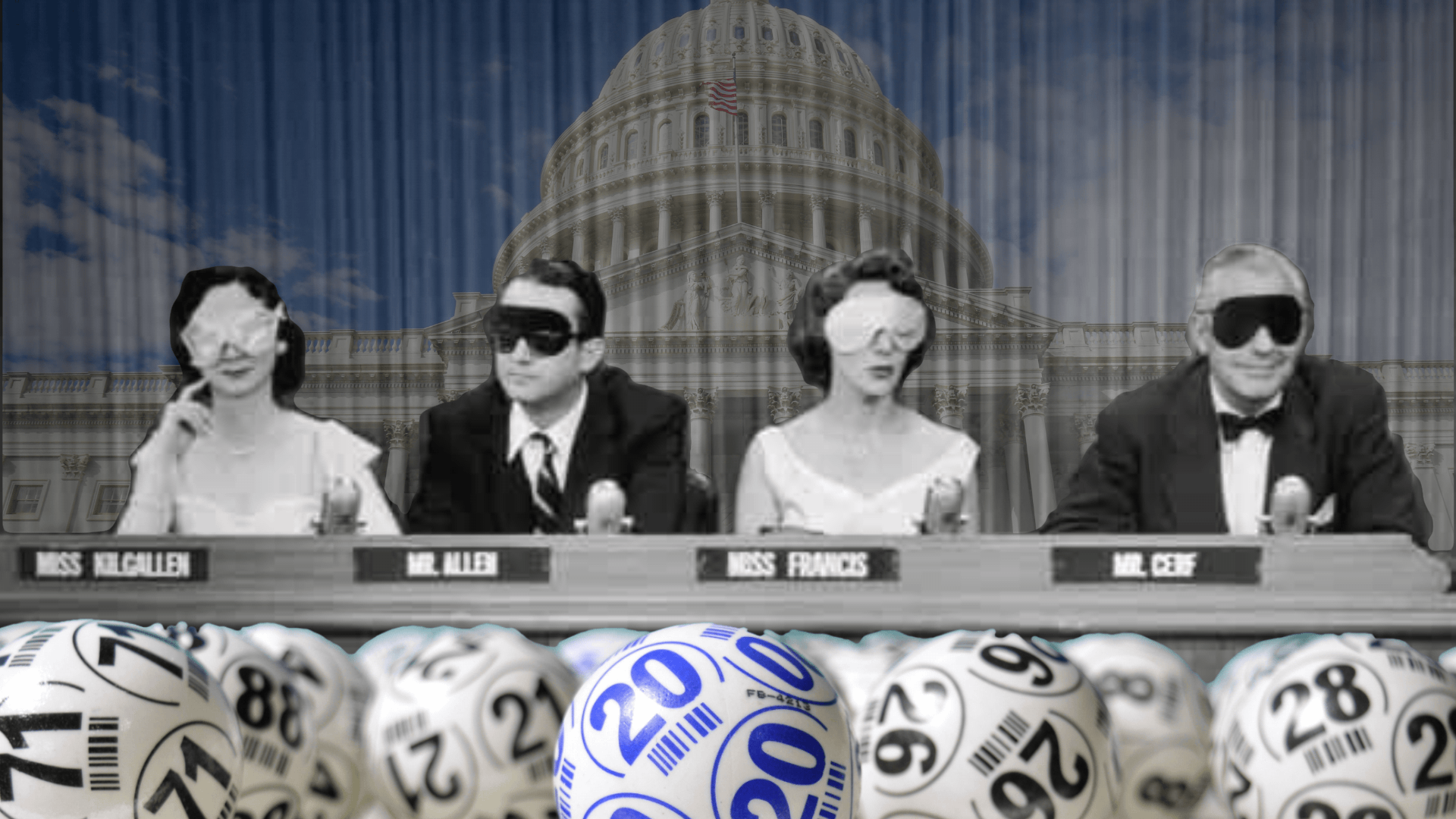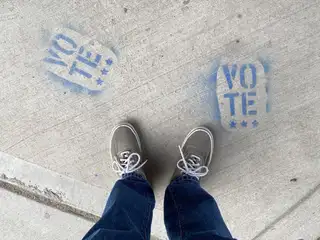
Let’s Reinvent American Democracy
The U.S. election system is broken, lifting privileged attention hogs with narcissistic traits up the ladder. Let’s redesign our entire system for choosing our representatives and leaders, from the ground up.
The current system is nearly useless. Not only are we not getting the most capable and qualified candidates, but the system actively selects for traits we don’t need or want in those leading us, and filters out those we want.
If you’re a humble, thoughtful, respectful leader, who values nuance and compromise, it’s understandable that you’d want to opt out of the political circus. But if you’re a schemer who loves to be the center of attention, hungry for power, and willing to say and do pretty much anything to get it, getting elected is the best part, and the path to power in government is clear.
But even if we lived in a country filled only with well-meaning politicians, motivated by serving their fellow citizens, and doing good in the world, the system is broken. And even if it’s old news, it’s worth revisiting briefly how it’s broken, before we talk about alternatives.
Impossibly bad choices
From the very get-go, we expect too much of people: Modern governments direct everything from economics to public health, military strategy to environmental policy, infrastructure to diplomacy, food security to disaster preparedness, in an ever-more complex and interconnected world.
Don’t get me wrong: It is perfectly reasonable to expect voters and politicians to have priorities and preferred outcomes on a wide range of issues. However, expecting them to make informed decisions about how to achieve those outcomes in even one such area, much less all of them, is not. Having amateurs choose between other amateurs tasked with tackling such a wide range of complex issues is already a questionable strategy, but that’s not my main concern.
Such a system might work, if it made plenty of allowance for uncertainty, course corrections, compromises and gradual adjustment. Unfortunately, the two-party system practically ensures that every issue becomes binary, a game of either/or, with little room for nuance.
The current “winner take all” elections make sure that any vote for a third party, a middle way, a different strategy, is effectively wasted. The choice is only ever between one thing, or the other.
And which options are on the table?
Closed party primaries, where the most highly engaged party loyalists, professionals, activists and radicals, are disproportionately represented, make sure that the options on offer are increasingly extreme. The candidates are typically the most cock-sure, uncompromising and polarizing, their positions and solutions ever-more total and divisive.
All of this is only exacerbated by the fact that you need large amounts of time, money and connections to run for office effectively. The game of party politics is reserved for the elite, and even that elite is beholden to wealthy donors, who are as uninterested in compromise as any other activists.
The problem of re-election
As if all of that wasn’t bad enough, the current system requires that the people who are supposed to be representing us, spend all their time stumping, raising money, keeping donors happy, and posing for the TV cameras instead of actually governing. At least if they want to be re-elected later.
This is not hyperbole, it is inevitable.
If every extra hour and day you spend getting re-elected increases your chances of success, then the winners will be those who spend every available hour of every day getting re-elected.
The only variable in the equation, then, is what it means to “spend time getting re-elected”. There may be diminishing returns on the total number of days you spend actively campaigning. However, you can always raise money, raise your own profile, and raise the temperature of the political climate to keep your base engaged.
The only incentives to actually govern, then, is to give donors what they’re paying for, and make sure it’s not too obvious to voters that you’re not actually doing your job. Just governing in service of being re-elected. But the less time that requires, the better.
If you want to spend your time in office actually governing, you are courting defeat in your next election. But of course, the donors, advisors and media that got you elected the first time won’t let you waste your time like that.
So what can we do?
We need to remember that democracy is more than just voting and waiting for the next election. It’s about giving regular citizens a voice, and there are more ways to do that than asking them to choose between two career whiners on a stage.
It may seem strange to us now, but senators, both in the ancient Roman Republic and in the early United States, weren’t elected, but appointed (albeit by elected officials). This led to a lot of corruption and a lack of democratic accountability, so it’s hardly a system we want to return to, but it’s a reminder that there’s more than one way to pick a representative.
Another example comes from the ancient Athenians, who are often considered O.G.s of western democracy. They rarely elected their public officials. Instead they used a process called sortition, which was little more than a lottery that picked representatives at random from the eligible class. The job of government was broken down into small, manageable tasks and run by committees of about 10 such officials, picked at random.
Again, I’m not suggesting we copy that system. Not least because ancient Athens was a city state, with a population roughly 1/20,000th the size of the U.S, and an area a bit more than half the size of Rhode Island.
For that same reason, democracy was also more direct and more local in ancient Athens than in the U.S. today. People actively debated and voted on issues that typically had very direct impact on their lives, in their town. Society, government, technology, diplomacy …. Despite all their inherent complexity, none of these things appeared nearly so complex as they do today. It was only natural, then, to be both informed and engaged.
If the ancient Greeks had to have sophisticated opinions on fracking in an area thousands of miles away, technology that none of them understood, or a war on the other side of the globe, their democracy might not have looked like such a role model for later civilizations.
But maybe we can take some inspiration? If we apply an open mind and some creativity, maybe we can take the best parts of the old ideas and adapt them to our modern times and technology.
For example, we may want to keep some element of random selection among the people, to make sure broad sections of the people are represented, while making campaigning and fundraising more or less unnecessary.
And we might remember that democracy seems to be at its most successful when the electorate is engaged, well-informed, and supportive of the process; and that democracy is most engaging when it is direct and local, able to affect relevant change to the citizens’ own lives, and centered around solving important issues, not about loyalty to people or parties. That, at least is the spirit of these ideas.
Issues, not people, first
One lesson might be about making democracy primarily about prioritizing ideas and issues, not people.
Instead of picking from a list of people each year, imagine if we were asked to prioritize from a list of issues. We would be asked what is most important to us — whether locally, state-wide or nationally.
I picture a ballot that largely mirrors the organization of the government — with topics that more or less reflect the committees, departments, and offices, ordered hierarchically.
That seems like a lot, I know, but it doesn’t have to be. There could be two ways to vote / prioritize:
90 percent of people would probably prefer the easy way, where you just sort issues into the order they concern you. E.g. Health care on first; Immigration policy second; Infrastructure → Local → Upgrade Post Road on third; Economy → Fiscal responsibility fourth, etc. You don’t have to have an opinion on every, or even many issues. You can pick just one issue if you want, or you can choose as many as you wish — so long as you put them in prioritized order.
You don’t even have to know which level or branch of government is responsible for fixing your favorite issue, or have strong opinions on how to solve the issues. It’s not as though we really need voters to explain how they believe healthcare or immigration is broken. The general outline of the problem is usually quite obvious to insiders and experts — it’s coming up with a good solution that’s the problem. And while voters may have different ideas about the best way to solve it, the truth is that at least 95 percent of us have no clue! We know nothing substantive about the economics of public health, or the practicalities of maintaining a border, and we’re not that interested in the details. We just want competent people to create systems that work.
However, there should be ways for wonky people with special interests to go deep, if they wish. If you’re a voter who doesn’t shy away from a bit of complexity, you can take more fine-grained control of your ballot. For example, by distributing 1000 points among issues, sub-divided into near tactical priorities, so as to weight and prioritize them. (E.g. 300 points to “Health care → Single payer → Swedish model”; 178 points to “Gun rights → 2A protection”; 50 points each to “Economy → Job creation” and “Economy → Tax reduction → No tax on tips”; and so on, own the ballot.)
The key here is prioritization. Good priorities are absolutely essential for managing effectively, and pretty soon voters will probably get pretty good at thinking in terms of priorities, instead of just high expectations.
Initially, the list of issues on the ballot should reflect the organization of government, e.g. the cabinet or the committees in the legislature. But we would have mechanisms by which new issues are added, for example through courts, lower-level governments, citizen initiatives, and write-ins. And issues with little interest should be slowly purged from the list.
One additional point: As with your tax return, submitting a ballot should be mandatory (though you can leave it blank if you wish). And also like your tax return, it should be largely confidential, but not entirely secret. The reasons for that will become clear in the next step.
This list of priorities, accumulated for all citizens, should produce a complete, prioritized list of issues, that should work as a guiding light for the officials chosen to govern.
A Nomination Committee
The next challenge, then, would be to select the people we need to execute our list of priorities. But how should we do that?
What if we created a nomination committee for each level of government, selected virtually at random from all citizens who meet some minimum requirements. For local elections, the requirements might be that they are 25 years or older, with a high school diploma or GED, and have submitted a ballot in the last three elections.
I say virtually at random, because it’s an important job that requires some basic qualifications. And it might also make sense to slightly weight the selection, so that people with views that align with the median voter have a higher chance of being selected for the committee, than people with more extreme views.
For state and federal elections, we might also want to limit the selection pool to people who have successfully served at least one term on a local committee, or have some other relevant record of public service, so they have shown that they are up for the job.
Once picked for the nomination committee, there’s a quick vetting process — for health, mental health, criminal record, national security, etc. — with clear and transparent criteria for disqualification. You can also apply for dispensation, if you believe serving will be to your serious detriment. Other than that, serving is mandatory (like jury duty or the draft), but it’s also a well-compensated privilege.
And then the nomiantion system gets to work: They select, recruit and vet a handful of candidates for each office, to make sure the people on the ballot aren’t just the kind of thirsty masochists who self-select to run for office in our current system.
Everyone has a chance
Now, you might think this seems undemocratic — that a small group of people should select who we can even vote for. But that is largely what happens today anyway. The major difference is that the committee is (semi-)randomly selected from the entire qualifying population, and is far more likely to be representative of the people, than the small clique of party elites, wealthy donors, and media insiders who pick the candidates in our current system.
It’s worth noting that in this proposed system, everyone still has the opportunity to run for office, but it is much harder to game the system. Anyone, including incumbents who have not reached their term limit, can apply to the committee to be considered for a place on the ballot, but they are in no way guaranteed one, and it would be stupid to bet one’s career on believing otherwise.
Additionally, committee members are expected to seek out and actively recruit highly-qualified candidates.
For example, when finding candidates for city council, they might look at local business people, activists, or school principals, and either nominate those people or ask them for recommendations. A successful mayor might be a good nominee for governor, and a successful governor or cabinet member might be a good candidate for president, even if they haven’t applied.
The nomination committee also has the voters’ list of priorities, and see potential candidates’ prior issue ballots (with their permission, of course), and takes that into consideration when vetting suitable candidates. So if your priorities diverge too much from those of your neighbors, you are unlikely to be a good candidate, but if your views represent a moderate compromise between extremes or a representation of the common opinion, your chances increase drastically.
Add to that, people whose stated priorities align closely with that of the population as a whole, should be algorithmically encouraged to apply at an appropriate level. So the restauranteur and the social media manager and the bank teller who in the last election revealed priorities that almost exactly align with the priorities of their town, are encouraged to apply to serve in public office at the local and regional level, which might put them on the radar for future nomination committees for other offices.
Other guidelines for the committee include being skeptical of anyone who seems to be campaigning too actively before the slate is announced; considering track record and not automatically nominating incumbents; weighing political experience against non-political; considering experience at the relevant scale of organization and leadership; thinking about representation that mirrors the population, and trying to create a varied slate of qualified candidates considering all those variables.
Obviously, the committee can’t force anyone to run for office, but because the system has been entriely revamped, running no longer requires the same investment of time, money and reputation, nor the same network of wealthy donors, as it does today. That should lower the bar to entry significantly, and make it easier to accept.
How to get elected
A good committee will consider that there should be somewhat different criteria for executive roles, like mayor, governor or president, than for members of various councils and assemblies. Ultimately, it has to be about ability to do the job of governing effectively in accordance with the will of the people.
The best way for someone to get into political office, then, is not to spend too much energy getting into a political office, but to share the values of your community, and do such a good job in your current position, that you are noticed and nominated by a committee of your peers.
At the end of the nomination process, the committee has gone through a hopefully large applicant pool, selected and vetted candidates, and narrowed it down to a reasonably varied slate of four to six qualified candidates for each office in their mandate. There is no such thing as a perfect candidate, of course, but the committee will have tried to identify candidates’ weaknesses, quirks or controversial opinions, and balanced that out in other candidates, so that people can choose their trade-offs.
The final candidates are officially announced eight weeks before the election, along with a prepared dossier for each, that includes the candidate’s background and experience, and priorities from previous years’ ballots. Maybe we even help each candidate record a well-prepared video, in a format that is as standard and recognizable as a TED talk, where they can present themselves.
The candidate then has eight weeks to promote themselves as best they can and will, and the media has eight weeks to do their job of interviewing each candidate on a range of issues and views, before Election Day, when the voters use ranked choice voting to pick their favorites.
Improvements over the status quo
If this works as expected, choosing who to vote for would no longer be a question of party politics (political parties may still have a role in society, but a much smaller one), nor of choosing the lesser of two evils (extreme and radical candidates have all been filtered out early in the process). It will not be about money and outspending the competition to the same degree (there’s not much time to raise or spend money).
Instead, you will have to choose your preferred candidates based on how you judge their competence, character, charisma, and core values, as well as their opinion on the issues that matter most to you.
However, even controversial single issues will probably play a smaller part. Because of how they are selected, the candidates may disagree on issues, but will rarely be at opposite extremes. They are all more likely to have nuanced, “common-sensical” positions — some more liberal, some more conservative. And since representatives no longer rely so heavily on political parties for their careers and support, political factions will be looser, and it will be easier for individual representatives to vote their conscience on the issues, as opposed to voting along party lines. Besides, they will know what the mandate from the voters is, and be well-informed about their voters’ priorities.
Lobbying will still be important, but people’s political careers will typically be shorter, and more clearly guided by values and priorities. That will change the economics of influence, and there will be more to gain by persuading the electorate itself, rather than individual representatives, so as to increase the number of people who agree with you.
That way you can change people’s priorities, as well as increase the likelihood that the nominees and the people on the nomination committee agree with you. This, however, is perfectly legitimate persuasion and influence, that necessarily has to happen out in the open, compared to shady backroom dealings.
For most people, the election season under this system would only last about eight weeks, from the slate of candidates has been announced until Election Day. I think many people would agree that this alone would be a huge improvement over the current system, with its 18-month-or-more election season.
What else?
This suggestion is, of course, not particularly realistic. It’s not meant to be. Rather, it’s a prompt to start thinking about how we might improve democracy, and a hint that it may require something more radical than discussing (but never really making any real progress on) campaign finance reform, or replacing the voting machines.
Maybe we need to do something to reverse the centralization of power, to make sure people feel like they can affect real change in their local communities? Maybe we can make approval voting or ranked choice voting more widespread? Maybe we replace more winner-take-all elections with proportional representation, so fewer people feel that their votes are wasted…
One small thing we could do, is redesign election day to make it more joyful, as I’ve suggested before.
There are tons of interesting ideas out there. What’s your favorite? And how do we get it done?



